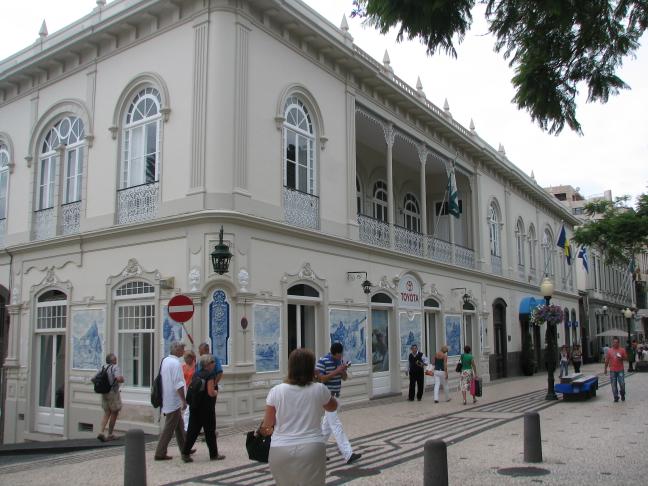I was worried about making the connection, but the TAP flight from Recife to Lisboa was trouble free. A fairly new plane even. I transfered to terminal 2 with 4 hours to spare for lunch and catching my breath. It's kind of strange to fly northeast for 5000 km and then back the other way for 1000 km on the same day, but modern travel is like that.
Like the Canary Islands, which belong to Spain, Madeira is volcanic in origin. Unlike the Canary Islands, there aren't any sandy beaches on Madeira though there are some on Porto Santo, another island of the group, which I won't be visiting. I've had enough of beaches for a while anyway. So Madeira gets a different kind of tourist, perhaps older, and looking for something other than a tan. On my visit to the CI 5 years ago I had meagre pickings with backpacker accommodation because most accommodation is in the form of holiday apartments rented to package tourists. No such problem on Madeira. The locals are more likely to speak some English than mainland Portugal because of tourism. And Madeira has a long history of association with Britain from the madeira trade. Names of British merchants are scattered throughout its history.
Madeira is a lush, verdant island. But flat land is rare and terracing makes the most of the land. The landing approach is said to be as exciting as the old Hong Kong airport with a special last minute bank required. The hillsides run down to the Atlantic ocean. There is a highway linking Funchal with the airport to its east and points beyond but the local bus used the older road linking the towns. This road is entwined with the highway through many convoluted access ramps that must be the pride of Madeira's highway engineers.
Madeira is like a balm after the hustle and bustle of Brazil. I chose it for that reason and also to compare with the Canary Islands. It's pleasantly cool, daytime temperatures hover around mid-20 all year. Evenings are fantastic. I'm sitting in my shorts on the terrace as I type, with a glass of Portuguese mainland red and a slice of Madeira honey cake to hand. Speaking of wine, I don't know how this Portuguese supermarket chain, Pingo Doce, their Aldi if you like, has such low prices for table wines. Sure, it's table wine, but the equivalent of just over $2 a bottle, wow! I bought a slightly better vintage and it was perfectly drinkable.
I didn't do much the first day except look at the historic buildings in Funchal. That statue is of Zarco, the Portuguese who brought "the first fleet". Incidentally when an immigration official asked me where I was staying in Funchal, I realised that I had been pronouncing it wrong in my mind. I was calling it "foon-kal", but of course I should have remembered that Portuguese requires that it be pronounced "foon-shal". I had intended to visit the Botanical Gardens but I watched the bus depart its stand as I was waiting to cross the road. The next one wasn't for an hour. Bus services here are mostly for the locals. Dang. So I decided to go up to Monte, where there is a lookout over Funchal.
Like the Canary Islands, which belong to Spain, Madeira is volcanic in origin. Unlike the Canary Islands, there aren't any sandy beaches on Madeira though there are some on Porto Santo, another island of the group, which I won't be visiting. I've had enough of beaches for a while anyway. So Madeira gets a different kind of tourist, perhaps older, and looking for something other than a tan. On my visit to the CI 5 years ago I had meagre pickings with backpacker accommodation because most accommodation is in the form of holiday apartments rented to package tourists. No such problem on Madeira. The locals are more likely to speak some English than mainland Portugal because of tourism. And Madeira has a long history of association with Britain from the madeira trade. Names of British merchants are scattered throughout its history.






No comments:
Post a Comment